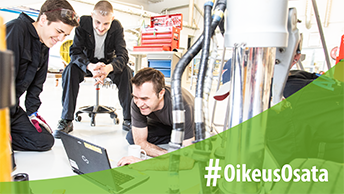Preparing the Programme to Develop Quality and Equality in Vocational Education and Training

The programme aims to make sure that vocational education and training is of high quality and encourages the continuous development of quality in line with the effectiveness objectives and policies of the Quality Strategy for Vocational Education and Training. It also aims to reduce and prevent differences in learning and learning outcomes related to gender, socio-economic background, place of residence or need for support. This, in turn, advances equality and non-discrimination in vocational education and training.
The three-year programme is part of the implementation of the Government Programme of Prime Minister Sanna Marin's Government. The programme promotes raising the level of competence, strengthening equality and non-discrimination in education, reducing learning gaps and realising objectives related to developing quality in vocational education and training, as outlined in the Government Programme.
In addition, it helps prepare the of Government’s key measures, such as extending compulsory education, reforming continuous learning, and preparing measures for supporting integration. The programme will pursue and step up support for the implementation of the reform of vocational education and training.
Over the course of three years, a total of over EUR 270 million will be used to develop vocational education and training. Strategic funding will also be directed to support the objectives of the programme.
The programme for developing quality and increasing equality in vocational education and training consists of four sets of measures:
- improving learning conditions and learning outcomes
- strengthening wellbeing, a sense of community and inclusion
- Support for reorganising procedures and practices and support for managing the reorganisation
- Ability to respond to changes in the operating environment.
The programme brings together vocational education and training providers, students, teachers and partners in the world of work, other professionals and stakeholders in vocational education and training, and officials from the Ministry of Education and Culture and the Finnish National Agency for Education to work together to develop quality and equality in vocational education and training. A broad-based steering group will be appointed to guide, monitor and support the implementation of the programme.
Improving learning conditions and learning outcomes
The following measures will help improve learning conditions and learning outcomes and ensure quality in vocational education and training (funding EUR 259 million + strategic funding):
- increasing the amount and quality of support for instruction and guidance and student support
- versatile and student-centred pedagogical methods
- stepping up study guidance in transition phases
- operating models for peer group and homeroom group guidance
- guidance models for students with intensive special needs support
- ensuring the quality of personalisation and training organised in a workplace and further developing digital solutions that support them
- harnessing learning analytics to support study progress and to ensure learning outcomes
- reform of the criteria for good study guidance
- strengthening basic skills and further learning capabilities
- diversifying opportunities for completing common units in vocational education and training
- upskilling the competence of workplace instructors and teaching and guidance staff
- Surveys and studies (on the model of positive discrimination suitable for vocational education and training, the extension of the three-step support system in basic education to vocational education and training, the implementation of demonstrations and the results of studies shown in demonstrations, and binding numbers of instructors in vocational education and training).
Strenghtening wellbeing, a sense of community and inclusion
The following measures will be used to strengthen wellbeing, a sense of community and inclusion (funding EUR 7 million):
- boosting students' empowerment
- development of student community activities
- strengthening the procedures and practices in the community
- developing and disseminating cooperation models for youth work and educational institutions
- enhancing security procedures and practices
- expanding the work capacity passes and mobility activities in vocational education and training
- other new development measures to be mapped out together with students.
Support for reorganising procedures and practices and support for managing the reorganisation
The following measures will be used to support the reorganisation of the procedures and practices of vocational education and training providers and managing the reorganisation (funding EUR 3 million):
- support for the management of restructuring
- networks for peer learning in educational institutions' management
- education packages designed for the management of educational institutions
- developing pedagogical management and service management
- support for implementing evidence-based good practices and processes.
Ability to respond to changes in the operating environment
The following measures will be used to improve the capacity of education providers to respond to changes in the operating environment (EUR 1 million + strategic funding):
- digital development roadmap
- support for enterprise architecture work and strengthening the knowledge-based skills of education providers
- monitoring indicators for quality and impact and indicators for assessing operating conditions
- diversification of learning environments
- closer cooperation with higher education institutions and general upper secondary schools
- support for voluntary mergers for education providers
- a report on the operational and service capacity of the organiser network (as part of the education policy report).
Inquiries
Ministry of Education and Culture:
Tiina Silander, Director, Department for General Upper Secondary Education and Vocational Education and Training, tel. +358 295 330 188
[email protected]
Finnish National Agency for Education:
Sanna Laiho, Counsellor for Education, Vocational Competence, tel. +358 295 331 301
[email protected]

